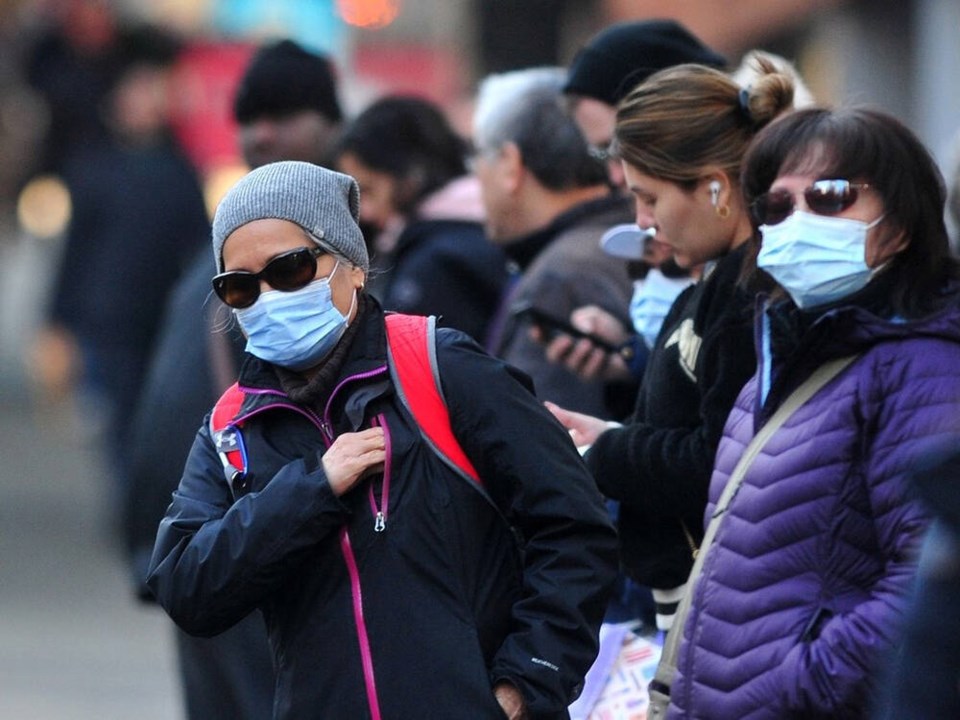British Columbians should mask up if they have any respiratory illness symptoms and can’t avoid close contact with others indoors, says B.C.’s provincial health officer.
“We are not looking at reintroducing mask mandates at this time,” said Dr. Bonnie Henry. But she said that could change if necessary as the pandemic evolves.
“We are seeing an increase in respiratory illnesses across the province,” Henry said Monday in an email. She said that is to be expected because viruses increase in the fall and winter and more people are returning to indoor activities without COVID restrictions.
Henry said those who are ill should remain at home until the fever disappears (without medication) and they are well enough to engage in usual activities. And she suggested avoiding non-essential close contact with those 70 and older, long-term care residents and immunocompromised individuals, as well as staying away from long-term care homes and hospitals until you feel better.
“If you have symptoms but it is essential to be in close contact with others, preventative measures such as masking in indoor spaces, washing hands and respiratory etiquette can reduce the risk of respiratory illness transmission,” she said.
She said hospitals in other provinces are seeing “higher than normal” volumes of patients, including children.
But she said that in B.C., “even though we are seeing more respiratory illness circulating, we are not yet experiencing a COVID-19/influenza/RSV surge in hospitalizations.”
Ontario’s chief medical officer of health strongly recommended Monday that residents wear masks in indoor public settings to protect children from a “triple threat” of respiratory viruses, while Alberta’s premier said she will not impose a mask mandate and urged people not to panic.
Children’s hospitals in Ontario have been overwhelmed by an influx of patients in recent weeks, with younger children under threat from the flu and the respiratory syncytial virus, or RSV, while COVID-19 continues to circulate.
The children’s hospitals are at 100 per cent capacity and “we’re asking more people to mask up,” said Dr. Keiran Moore, Ontario’s top doctor.
He did not mandate masking, but said he is “discussing and reviewing” the possibility of requiring masks in schools again. He also recommended children between ages two and five wear a mask, if possible.
Henry said that COVID infection and vaccination have resulted in a “very high level of population immunity and the number of people at risk for serious outcomes from COVID-19 has dropped significantly.”
“Even amongst the frailest elderly populations in long-term care facilities, most vaccinated residents with COVID-19 experience mild symptoms,” she said.
Long-term care homes collect data on rates of infection and submit those to the health ministry, said Terry Lake, CEO of the B.C. Care Providers Association.
“They’re keeping a very close eye on things. We’re the canary in the coal mine,” he said. “We would know if things were getting out of hand.”
He said all staff wear masks and all visitors 12 and over must take a rapid antigen test before visiting and wear a mask in the common areas of the home. Children 11 and under must be masked at all times but are not required to test before entering, he said.
“Our first line of defence remains vaccination,” said Dr. Brian Conway, president of the Vancouver Infectious Disease Centre. “Masking for sure is the additional line of defence.”
He said it is up to individuals to take responsibility to wear a mask or not, dependent on whether or not there are cases of COVID in the school or workplace, for a few days after returning to the public arena after recovering from COVID, or when you’re indoors and it’s difficult to maintain a safe distance from others.
“In certain settings, mask use makes sense and we should wear a mask whether the government tells us to or not,” he said. “You should always have a mask on your person and just wear it if you go into a confined space with lots of people.”
Conway and Henry said it’s important to remain at home if you’re sick.
“I want to be clear about this: You don’t go out (to work, school or social events) when you’re sick just because you’re wearing a mask. Stay home if you’re sick,” said Conway.
Henry encouraged all to get vaccinated “with whichever dose they are eligible for, as soon as they can.”
Health officials will continue to monitor the global pandemic and change protocols if necessary, she said.



